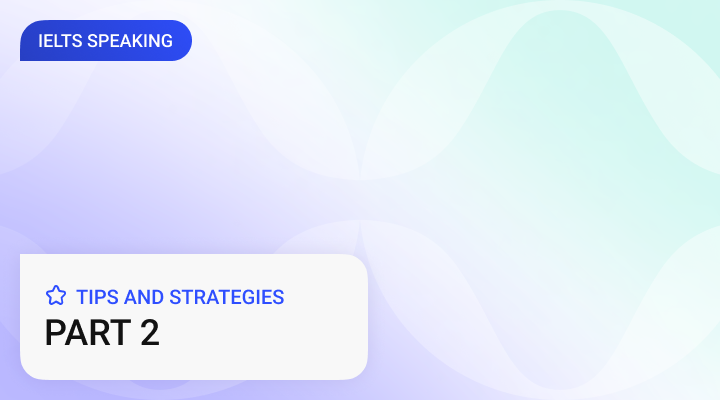Are you aiming to excel in Part 2 of the IELTS Speaking exam? Look no further! This comprehensive guide is here to provide you with invaluable tips that will elevate your IELTS band score to new heights.
These are some IELTS Speaking tips that you could leverage during the exam.
IELTS exam tips to succeed in Speaking Part 2: Mastering Examiner's Questions
Picture this scenario: You find yourself in front of the examiner, bracing for the onslaught of questions. How can you increase the likelihood of achieving success? Consider the following essential actions to optimize your chances:
- Use your 1 min for preparation to think about what you are going to say, prepare a plan and brainstorm the relevant vocabulary and grammar, take notes if necessary.
- Having an introduction, main body and conclusion will help you to get a higher score for coherence and cohesion. At the beginning of your speech you can say “I’d like to speak about…” and at the end of it “That’s all what I wanted to say about…”.
- Ask questions to the examiner if you don’t understand something.
- Examples: “Sorry, could you repeat the question, please?” or “What does the word _______ mean?”
- Control the time and make sure you cover all the questions from your task card in 2 min.
- Use topic-specific words and expressions to demonstrate the range of your vocabulary.
- Use a variety of grammar structures to boost your grammar score.You can include different tenses, the Passive voice, relative clauses, comparative and superlative adjectives and adverbs, modal verbs and so on.
- Give yourself time to think using fillers “well…”, “let me think…”.
- Be coherent and use linking devices such as moreover, however, although, etc.
- Keep fluency and accuracy in balance.
- Speak clearly at your natural pace and loudly enough.
- Be friendly and polite.
- Examples: “Sorry, I’ve missed that. Could you repeat the question, please?”, “Let me think…”.
In order to achieve exceptional results in the IELTS Speaking exam, it is crucial to recognize and gracefully avoid potential pitfalls.
Navigating the IELTS Speaking Part 2: Key Mistakes to Avoid
Mastering the IELTS Speaking exam requires more than just showcasing your language skills. It demands a keen understanding of the potential stumbling blocks and tactful navigation around them. To help you achieve your best performance, here are some critical DON'Ts that you must bear in mind while approaching the IELTS Speaking Part 2.
- Don’t miss a chance to use your 1 min for preparation wisely.
- Don’t worry if you don’t know much about the topic. The examiner will assess only your English and ability to give arguments in English.
- If you aren’t sure about some place, date or fact, try to find another example.
- If it’s hard, you can say “I don’t remember exactly, but I guess…”, “I don’t know much about the topic, but I’ve heard that…”.
- Don’t repeat the words from the task card if possible, try to paraphrase them so that you demonstrate the range of your vocabulary.
- Don’t use the words and grammar that you aren’t sure about, use what you know well.
- Don’t pause for too long if you can’t find the right word. Paraphrase or change the topic.
- Don’t panic if you’ve made a mistake. Correct yourself or just keep speaking.
- Don’t use very informal words and expressions at the exam.
- Examples: “wanna”, “kinda”, “stuff”.
Check out our tips on Part 1 and Part 3 in the following articles:
Enhance your vocabulary, sharpen your speaking skills, and practice regularly using the SmallTalk2Me platform. With SmallTalk2Me, you can simulate the IELTS speaking test experience by practicing with authentic exam questions. SmallTalk2Me will not only track your time and performance but also provide you with an accurate assessment of your IELTS band. Prepare yourself to shine in the IELTS Speaking test and achieve the score you desire with our online interactive IELTS mock tests.







